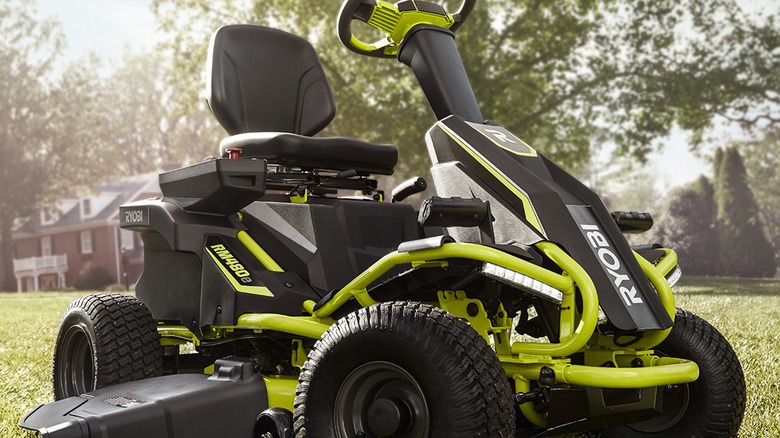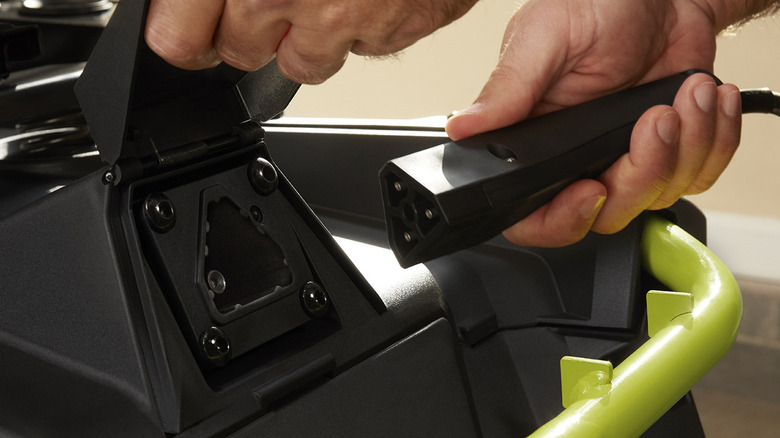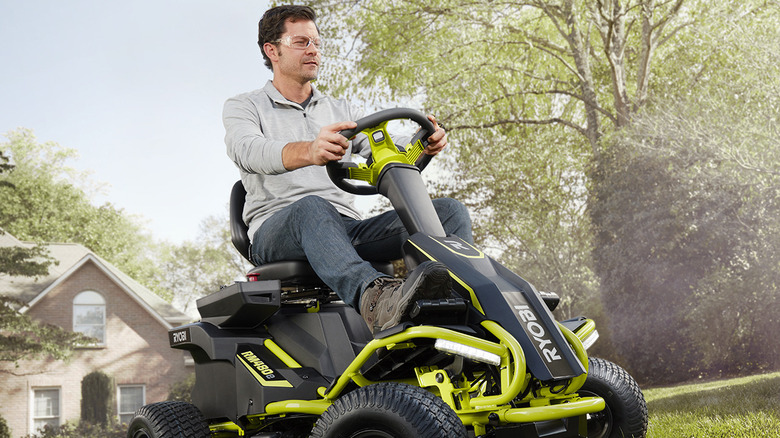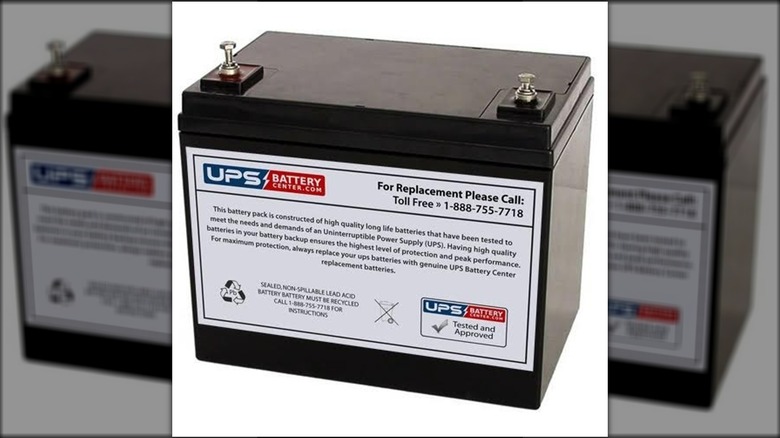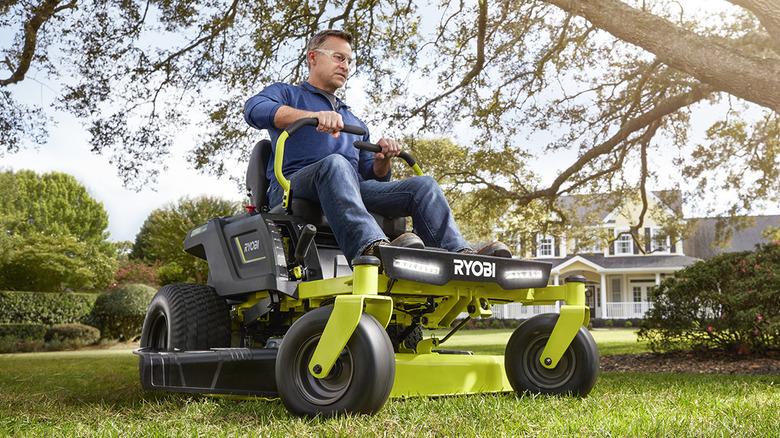How Long Do The Batteries Last In Ryobi's RM480E Electric Riding Lawn Mower?
Those who need to mow large areas of land on a frequent basis should consider buying a good lawn mower. There are plenty of premium brands on the market, but Ryobi's lawn mowers are generally considered to be worth the investment. The company offers an array of options, from traditional push mowers to drivable mowers, and the vast majority of its products are fully electric, meaning users simply have to keep their unit's battery charged instead of topping it up with gas between mowing sessions.
Ryobi's RM480E Electric Riding Lawn Mower is a solid option for anyone looking to ease the mowing process. The $2,999.00 unit, which takes the form of a small vehicle, allows the user to steer around the mowing area while the built-in mower does the brunt of the work. Most importantly, it's completely battery-operated, a major draw for people inclined to electric tools. But some will want to know more about how long the RM480E's battery life lasts on a single charge, the overall lifespan of its batteries, and how these statistics stack up against other Ryobi mowers. With that in mind, here are all the details about the RM480E's batteries worth knowing.
What kind of battery does the RM480E mower use?
While users can expect all the benefits of a battery-operated lawn mower from the Ryobi RM480E, they may not be too enthused upon learning the sort of batteries that the unit employs. According to Ryobi's official listing for the product, the RM480E runs on a 48V 75Ah battery system made up of four distinct batteries. The issue is that these batteries are of the lead-acid variety, which are prone to degradation and generally considered inferior to alternative options such as lithium-ion batteries.
Various user reviews have criticized Ryobi's choice to use lead-acid batteries in the RM480E, as replacing them when they inevitably fail can be costly. The RM480E is only officially compatible with Leoch LPC12-75 or LPC12-100 lead-acid batteries, which can cost anywhere from over $100 to upward of $200 for a single unit. Seeing as the RM480E takes four batteries, the total amount to replace these batteries can approach $800 — roughly a quarter of the initial price of the mower.
The fact that the RM480E relies on lead-acid batteries may be a dealbreaker for those concerned about the longevity of the stock unit's included batteries. However, it's at least worth noting that some reviews of the RM480E have alleged success in replacing the stock batteries with other higher-quality models from well-regarded battery brands.
How long does the Ryobi RM480E battery last per charge?
While the use of lead-acid batteries in Ryobi's RM480E may be controversial, users can still expect it to reliably last for extended mowing sessions — provided that the batteries are charged. The mower's official listing asserts that a fully charged set of batteries in the RM480E can last up to two hours of continuous runtime. Per the company's estimates, the unit can mow approximately two acres of land in that time.
Of course, the RM480E's two-hour runtime estimate is based on optimal conditions. As the included batteries start to degrade after extended use, even keeping them fully charged may result in a different amount of time for a single mowing session. Thus, it's important to take the appropriate measures to keep the RM480E's batteries as healthy as possible. These steps include keeping the batteries at least partially juiced up when they're not in active use inside the lawn mower and sheltering them from extremely high and low temperatures. Generally speaking, users can take cues from the common ways to prevent regular car batteries from dying.
What's the Ryobi RM480E lawn mower battery's lifespan?
While the optimal battery runtime for the RM480E is solid for many average use cases, some product reviews have reported common problems with Ryobi batteries, including complete battery failure. These issues are common for lawn mower batteries, and Gitnux estimates an average battery lifespan of just one to two years if maintained properly. Various reviews of the RM480E suggest that its included batteries can last anywhere in the range of one to four years before they have to be replaced.
It's worth noting that the RM480E comes with a three-year limited warranty from Ryobi, under which the replacement of failed batteries may fall in certain cases. As such, RM480Es that are still under warranty can potentially have one to two replacement batteries covered if they are faulty or fail on the shorter end of their average lifespan. Replacement Leoch LPC12-75 and LPC12-100 batteries have a basic included warranty of one year, though the purchaser has the option to extend the warranty to three years. In the long run, it's likely that users will eventually have to pay out of pocket to replace the RM480E batteries.
Other Ryobi mowers edge out the RM480E's batteries
Compared to the rest of Ryobi's electric riding mower options, the RM480E manages to stay within the same relative ballpark regarding battery life. However, there's no denying that a number of the manufacturer's other offerings in this department beat out the RM480E in battery quality and efficiency. For instance, the RM480ex is estimated to hit 2.5 acres' worth of runtime at a relatively comparable price point to the RM480E. Some units punch even higher, such as the ZT480ex and the 80V HP 42-inch Lithium Electric ZTR, which both clock in at a runtime equal to 3 acres. Of course, it's worth noting that these longer-lasting units are a fair bit more expensive than the RM480E.
The RM480E does beat out some of Ryobi's other mowers. For example, the 48-Volt 30-inch Riding Lawn Mower and the 80V HP 30-inch Lithium Electric ZTR both have a runtime of just one hour (enough to clear about one acre) compared to the RM480E's two hours.
Beyond the RM480E's runtime, there's another key reason to consider Ryobi's other rideable lawn mowers: their respective battery configurations. While several other units similarly rely on lead-acid batteries, some use power sources that are generally considered more reliable. For instance, the 80V HP Brushless series of mowers all use lithium-ion batteries, which can have a longer lifespan than their lead-acid counterparts. Of course, users should also consider the possible problems and disadvantages of lithium batteries before taking the plunge.
